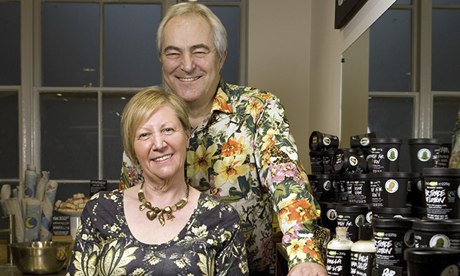
In the cut-throat world of retail, it is a David-versus-Goliath battle.
In one corner, there is Lush, the relatively small cosmetics company that takes a strong ethical stance on issues such as the environment, animal testing and giving to charity. And in the other, there is the might of Amazon.
Lush does not allow Amazon to sell its products and its co-founder, Mark Constantine, is extremely critical of the way the US company operates. But when visitors to Amazon type the word "lush" into its search field, they are directed to alternative cosmetic products that the online giant suggests they might like to buy instead.
Now Lush is taking Amazon to court, claiming it is infringing its trademark.
According to documents filed in court, "Lush brought trademark infringement proceedings against Amazon on the basis that when the term 'Lush' was searched for on Amazon's website, the results returned were for goods which, although they featured the word 'lush' in a number of contexts, were not in fact made by Lush. Amazon had also bid on the Google AdWord 'Lush Bath Products' but did not, in fact, sell any Lush products."
The case, on which a ruling is expected early next year, potentially has wide-ranging consequences. If Lush is successful, it could deter online retailers from making suggestions for alternatives to products that they do not sell and restrict how they use Google.
The case has similarities with another dispute between two well-known brands. In May, a judge found that Marks & Spencer's use of "Interflora" in Google AdWords, to produce results for its own service, infringed trademarks belonging to the flower delivery network.
The case will also serve to compare the two companies' business models.
Lush reportedly donates around 2% of its profits to charity and has supported a number of direct-action groups, including Plane Stupid, which campaigns against the expansion of UK airports, and Sea Shepherd, which opposes Japanese whaling.
But Amazon has come under fierce scrutiny over its tax position. Its main UK subsidiary paid just £3.2m in tax last year, despite overall UK sales of £4.2bn.
Constantine said Amazon's alleged infringement of Lush's intellectual property was a "way of bullying businesses to use its services and we refused". In an interview in the New Review examining how Amazon operates, he said: "We've been in the high court this week to sue it for breach of trademark. It's cost us half a million pounds so far to defend our business. Most companies just can't afford that. But we've done it because it's a matter of principle. [Amazon] keeps forcing your hand and yet it doesn't have a viable business model. The only way it can afford to run it is by not paying tax. If it had to behave in a more conventional way, it would struggle."
Constantine's comments will raise further scrutiny of Amazon's business operations as it prepares for a record-breaking Christmas. But critics question whether it is becoming too powerful. The company pays so little tax in the UK because its ownership has been transferred to Amazon EU Sarl, based in Luxembourg, allowing it to enjoy the country's low tax rates.
As a result, despite employing more than 4,000 staff in the UK, and an additional 10,000 temporary workers over Christmas, the company invoices customers from Luxembourg, which it maintains are its headquarters.
Consumer anger against the firm has been building. A petition of over 170,000 signatures demanding Amazon pay tax on UK sales was handed to Downing Street in the summer. "It is not making a contribution and there has to be some debate about this," Constantine said. "It's not conventional capitalism. What used to be the norm – paying your taxes – is now seen as somehow exemplary and that can't be right."
He suggested that the internet giant was promoting a form of outmoded capitalism that was shunned by many consumers.
"It's a form of piracy capitalism," Constantine said. "[Amazon] rushes into people's countries, it takes the money out, and dumps it in some port of convenience. That's not a business in any traditional sense. It's an ugly return to a form of exploitative capitalism that we had a century ago and we decided as a society to move on from."
Amazon did not respond to repeated requests for comment.

